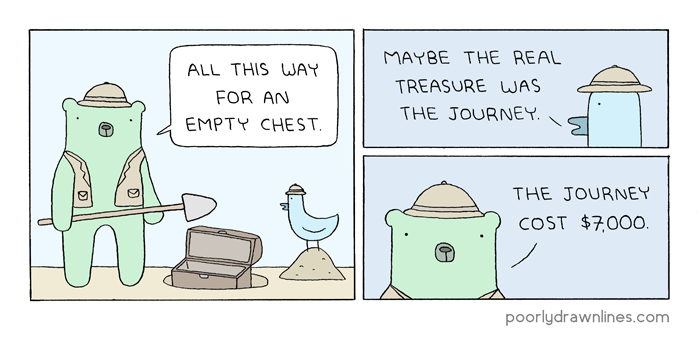Early in one’s life, it’s easy to be driven by goals. Pass the test, get the grade. Get a job, buy a car. Get into university, finish university. Get married, have a kid. There are a lot of things to do!
While the specific goals vary from person to person, our lives start out with a lot of low hanging fruit. Things that haven’t been done, but are clearly worth getting done. It can be a big motivator.
At a certain point though, perhaps in your 30s or 40s, this loop becomes less satisfying. The most straightforward goals have been achieved, and the most ambitious goals are starting to look, uh, ambitious. Even when you’ve done what you set out to do, it doesn’t feel quite right. “I’ve achieved all these things. I’m successful! Why don’t I float through each day radiating the tranquil joy of an accomplished human? Why do I still sometimes wake up feeling, a little bit, like a duffel bag of shit?”
Of course it’s well known that that achieving goals doesn’t directly make you happy. I learned the phrase “Life’s a journey, not a destination” all the way back in 1993, when it was coined by noted philosopher Steven Tyler. But it took 26 years for me to actually do something with this information, when I read an essay from Ed Batista that put me onto this idea, titled “Not Every End Is a Goal (On Midlife Malaise)”.
I was initially hesitant to read an article about midlife crises. I’m not even 40 yet. I have neither the inclination nor the time to have a crisis, let alone a midlife one.
And even if I did, what an embarrassing privileged white guy thing to do. People are out there – as we speak – fighting for their rights, fighting for their lives. Meanwhile I’m sitting here like a jackass thinking, “Hm, checking off these OmniFocus tasks isn’t giving me as deep a sense of self actualization as I’d imagined; what is my path to lasting purpose?”
Still, checking off those OmniFocus tasks really wasn’t giving me as deep a sense of self actualization as I’d imagined. So when that article put the following very useful idea on my radar, I was primed to receive it. Perhaps it will help you too.
You can divide how you spend your time into two categories..
- Telic activities. Things whose purpose is the end. Drive home. Have a wedding. Unclog a drain. Ship an app.
- Atelic activities. Things whose purpose is the middle. Explore the forest. Listen to music. Tinker with something you enjoy.
The problem for ambitious people comes when we load up on telic activities. We push ourselves to check things off and get things done, and feel perhaps guilty when we’re not getting anything done. There’s gotta be a balance.
And that ideal balance tends to shift as you get older. Your youthful focus on telic activities – things you’re glad to be done with – ideally adjusts over time to more atelic activities – things you’re glad to be doing.
This isn’t a secret formula to guarantee a purposeful and fulfilling life – that can only be achieved by playing a very 90s VR game where you watch a guy play a similar VR game about motorcycles and making out and… weird 3D dogs? But I’ve found it helpful.
Honestly, even just being thoughtful about when I’m doing something for the sake of doing it has been nice. I walk a little slower when I’m just going for a walk, I’m a bit less focused on finishing games, and I’ve been getting better at enjoying the parts of my job that I really enjoy – in the afternoons, once I’ve checked off the thing that really needs doing.
It’s amazing.
